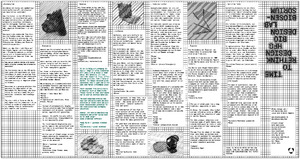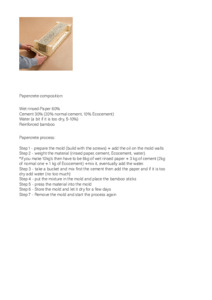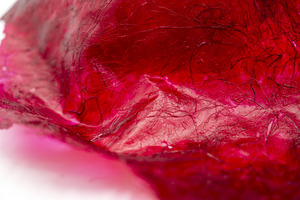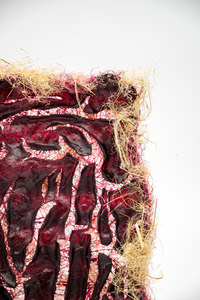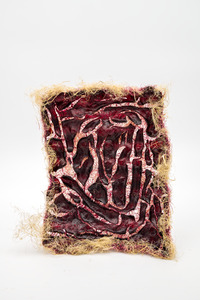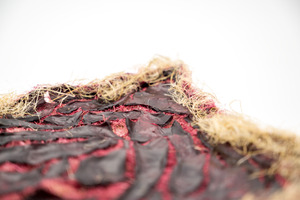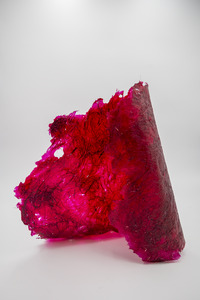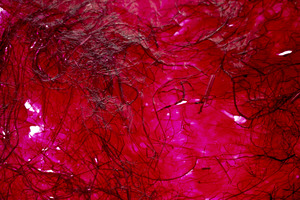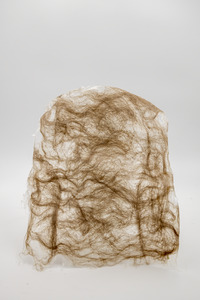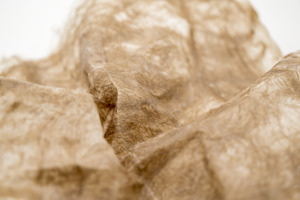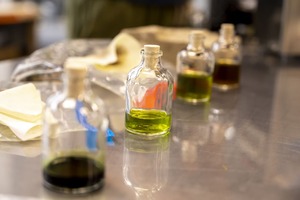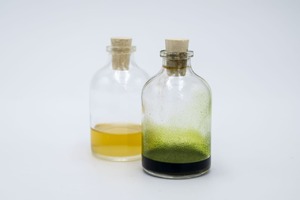"Karlsruhe"
| Begriff | Karlsruhe |
| Metakey | Stadt (creative_work:city) |
| Typ | Keyword |
| Vokabular | Werk |
1157 Inhalte
- Seite 1 von 97
Info-Leaflet for the Biosensorium
- Titel
- Info-Leaflet for the Biosensorium
- Titel (en)
- Biosensorium
- Beschreibung (de)
- Ein Info-Faltblatt, das in unmittelbarer Nähe des Biosensoriums ausgelegt war und von den Besuchern mitgenommen werden konnte, bot Einblicke in die Materialproben, die im Biosensorium ausgestellt waren. Diese Faltblätter wurden mit Spirulina-Farbe auf das recyceltem Papier gedruckt, welches auch für die Herstellung der Papercrete-Bricks verwendet wurde.
- Beschreibung (en)
- An information leaflet, which was displayed in the immediate surrounding of the Biosensorium and could be taken away by the visitors, offered insights into the material samples that were exhibited in the Biosensorium. These leaflets were printed with spirulina ink on the recycled paper that was also used for the production of the Papercrete bricks.
- Typ des Projekts/Werks
- Schlagworte
- Datierung
- Sommersemester 2021
- Mitwirkende
- Material
- Ort: Institution
- Ort
- Biosensorium
- Stadt
- Land
- Beteiligte Institution(en)
- Titel
- Info-Leaflet for the Biosensorium
- Urheberrechtshinweis
- Bio Design Lab, Lynn Sullivan, Giulia Bertolino
- Rechtsschutz/Lizenz
- Medienersteller/in
- Projektleiter/in
- Semester
- Lehrveranstaltung
- Importiert am
- 26.10.2023
- Übergeordnete Sets
- 1
Recipe for Papercrete Bricks
- Titel
- Recipe for Papercrete Bricks
- Titel (en)
- Biosensorium
- Typ des Projekts/Werks
- Schlagworte
- Datierung
- Sommersemester 2021
- Mitwirkende
- Ort: Institution
- Ort
- Bio Design Lab
- Stadt
- Land
- Beteiligte Institution(en)
- Titel
- Recipe for Papercrete Bricks
- Urheberrechtshinweis
- Bio Design Lab
- Rechtsschutz/Lizenz
- Medienersteller/in
- Projektleiter/in
- Semester
- Lehrveranstaltung
- Importiert am
- 26.10.2023
- Übergeordnete Sets
- 1
Starch-Based Bioplastic
- Titel
- Starch-Based Bioplastic
- Titel (en)
- Biosensorium
- Autor/in
- Beschreibung (de)
- Fotografien der während des Seminar „Biosensorium“ entstandenen Material-Samples.
- Beschreibung (en)
- Photographs of the material samples created during the "Biosensorium" seminar.
- Typ des Projekts/Werks
- Schlagworte
- Datierung
- Sommersemester 2021
- Mitwirkende
- Material
- Ort: Institution
- Ort
- Biosensorium
- Stadt
- Land
- Beteiligte Institution(en)
- Titel
- Starch-Based Bioplastic
- Urheberrechtshinweis
- Bio Design Lab
- Rechtsschutz/Lizenz
- Medienersteller/in
- Projektleiter/in
- Semester
- Lehrveranstaltung
- Importiert am
- 26.10.2023
- Übergeordnete Sets
- 1
Starch-Based Bioplastic
- Titel
- Starch-Based Bioplastic
- Titel (en)
- Biosensorium
- Autor/in
- Beschreibung (de)
- Fotografien der während des Seminar „Biosensorium“ entstandenen Material-Samples.
- Beschreibung (en)
- Photographs of the material samples created during the "Biosensorium" seminar.
- Typ des Projekts/Werks
- Schlagworte
- Datierung
- Sommersemester 2021
- Mitwirkende
- Material
- Ort: Institution
- Ort
- Biosensorium
- Stadt
- Land
- Beteiligte Institution(en)
- Titel
- Starch-Based Bioplastic
- Urheberrechtshinweis
- Bio Design Lab
- Rechtsschutz/Lizenz
- Medienersteller/in
- Projektleiter/in
- Semester
- Lehrveranstaltung
- Importiert am
- 26.10.2023
- Übergeordnete Sets
- 1
Starch-Based Bioplastic
- Titel
- Starch-Based Bioplastic
- Titel (en)
- Biosensorium
- Autor/in
- Beschreibung (de)
- Fotografien der während des Seminar „Biosensorium“ entstandenen Material-Samples.
- Beschreibung (en)
- Photographs of the material samples created during the "Biosensorium" seminar.
- Typ des Projekts/Werks
- Schlagworte
- Datierung
- Sommersemester 2021
- Mitwirkende
- Material
- Ort: Institution
- Ort
- Biosensorium
- Stadt
- Land
- Beteiligte Institution(en)
- Titel
- Starch-Based Bioplastic
- Urheberrechtshinweis
- Bio Design Lab
- Rechtsschutz/Lizenz
- Medienersteller/in
- Projektleiter/in
- Semester
- Lehrveranstaltung
- Importiert am
- 26.10.2023
- Übergeordnete Sets
- 1
Starch-Based Bioplastic
- Titel
- Starch-Based Bioplastic
- Titel (en)
- Biosensorium
- Autor/in
- Beschreibung (de)
- Fotografien der während des Seminar „Biosensorium“ entstandenen Material-Samples.
- Beschreibung (en)
- Photographs of the material samples created during the "Biosensorium" seminar.
- Typ des Projekts/Werks
- Schlagworte
- Datierung
- Sommersemester 2021
- Mitwirkende
- Material
- Ort: Institution
- Ort
- Biosensorium
- Stadt
- Land
- Beteiligte Institution(en)
- Titel
- Starch-Based Bioplastic
- Urheberrechtshinweis
- Bio Design Lab
- Rechtsschutz/Lizenz
- Medienersteller/in
- Projektleiter/in
- Semester
- Lehrveranstaltung
- Importiert am
- 26.10.2023
- Übergeordnete Sets
- 1
Starch-Based Bioplastic
- Titel
- Starch-Based Bioplastic
- Titel (en)
- Biosensorium
- Autor/in
- Beschreibung (de)
- Fotografien der während des Seminar „Biosensorium“ entstandenen Material-Samples.
- Beschreibung (en)
- Photographs of the material samples created during the "Biosensorium" seminar.
- Typ des Projekts/Werks
- Schlagworte
- Datierung
- Sommersemester 2021
- Mitwirkende
- Material
- Ort: Institution
- Ort
- Biosensorium
- Stadt
- Land
- Beteiligte Institution(en)
- Titel
- Starch-Based Bioplastic
- Urheberrechtshinweis
- Bio Design Lab
- Rechtsschutz/Lizenz
- Medienersteller/in
- Projektleiter/in
- Semester
- Lehrveranstaltung
- Importiert am
- 26.10.2023
- Übergeordnete Sets
- 1
Starch-Based Bioplastic
- Titel
- Starch-Based Bioplastic
- Titel (en)
- Biosensorium
- Autor/in
- Beschreibung (de)
- Fotografien der während des Seminar „Biosensorium“ entstandenen Material-Samples.
- Beschreibung (en)
- Photographs of the material samples created during the "Biosensorium" seminar.
- Typ des Projekts/Werks
- Schlagworte
- Datierung
- Sommersemester 2021
- Mitwirkende
- Material
- Ort: Institution
- Ort
- Biosensorium
- Stadt
- Land
- Beteiligte Institution(en)
- Titel
- Starch-Based Bioplastic
- Urheberrechtshinweis
- Bio Design Lab
- Rechtsschutz/Lizenz
- Medienersteller/in
- Projektleiter/in
- Semester
- Lehrveranstaltung
- Importiert am
- 26.10.2023
- Übergeordnete Sets
- 1
Starch-Based Bioplastic
- Titel
- Starch-Based Bioplastic
- Titel (en)
- Biosensorium
- Beschreibung (de)
- Fotografien der während des Seminar „Biosensorium“ entstandenen Material-Samples.
- Beschreibung (en)
- Photographs of the material samples created during the "Biosensorium" seminar.
- Typ des Projekts/Werks
- Schlagworte
- Datierung
- Sommersemester 2021
- Mitwirkende
- Material
- Ort: Institution
- Ort
- Biosensorium
- Stadt
- Land
- Beteiligte Institution(en)
- Titel
- Starch-Based Bioplastic
- Urheberrechtshinweis
- Bio Design Lab, Anthea Oestreicher
- Rechtsschutz/Lizenz
- Medienersteller/in
- Projektleiter/in
- Semester
- Lehrveranstaltung
- Importiert am
- 26.10.2023
- Übergeordnete Sets
- 1
Starch-Based Bioplastic
- Titel
- Starch-Based Bioplastic
- Titel (en)
- Biosensorium
- Beschreibung (de)
- Fotografien der während des Seminar „Biosensorium“ entstandenen Material-Samples.
- Beschreibung (en)
- Photographs of the material samples created during the "Biosensorium" seminar.
- Typ des Projekts/Werks
- Schlagworte
- Datierung
- Sommersemester 2021
- Mitwirkende
- Material
- Ort: Institution
- Ort
- Biosensorium
- Stadt
- Land
- Beteiligte Institution(en)
- Titel
- Starch-Based Bioplastic
- Urheberrechtshinweis
- Bio Design Lab, Anthea Oestreicher
- Rechtsschutz/Lizenz
- Medienersteller/in
- Projektleiter/in
- Semester
- Lehrveranstaltung
- Importiert am
- 26.10.2023
- Übergeordnete Sets
- 1
Kritische Zone riechen und sehen
- Titel
- Kritische Zone riechen und sehen
- Titel (en)
- Seeing and smelling the Critical Zone
- Beschreibung (de)
- Fotografien die während des Workshops „Kritische Zone riechen und sehen" entstandenen sind.
- Beschreibung (en)
- Photographs taken during the workshop "Smell and see critical zone".
- Typ des Projekts/Werks
- Schlagworte
- Datierung
- Sommersemester 2021
- Mitwirkende
- Ort: Institution
- Ort
- Bio Design Lab
- Stadt
- Land
- Beteiligte Institution(en)
- Internetlinks
- Titel
- Kritische Zone riechen und sehen
- Urheberrechtshinweis
- Bio Design Lab, Anthea Oestreicher
- Rechtsschutz/Lizenz
- Medienersteller/in
- Projektleiter/in
- Semester
- Importiert am
- 30.10.2023
- Übergeordnete Sets
- 1
Kritische Zone riechen und sehen
- Titel
- Kritische Zone riechen und sehen
- Titel (en)
- Seeing and smelling the Critical Zone
- Beschreibung (de)
- Fotografien die während des Workshops „Kritische Zone riechen und sehen" entstandenen sind.
- Beschreibung (en)
- Photographs taken during the workshop "Smell and see critical zone".
- Typ des Projekts/Werks
- Schlagworte
- Datierung
- Sommersemester 2021
- Mitwirkende
- Ort: Institution
- Ort
- Bio Design Lab
- Stadt
- Land
- Beteiligte Institution(en)
- Internetlinks
- Titel
- Kritische Zone riechen und sehen
- Urheberrechtshinweis
- Bio Design Lab, Anthea Oestreicher
- Rechtsschutz/Lizenz
- Medienersteller/in
- Projektleiter/in
- Semester
- Importiert am
- 30.10.2023
- Übergeordnete Sets
- 1
